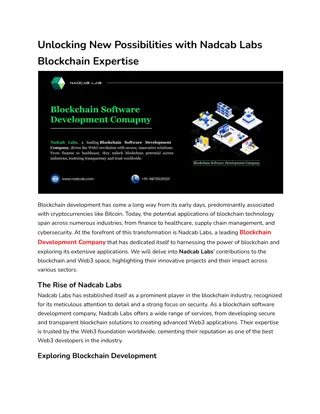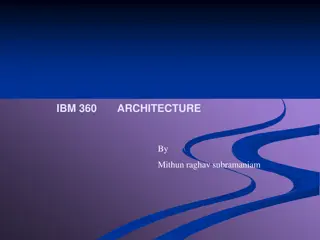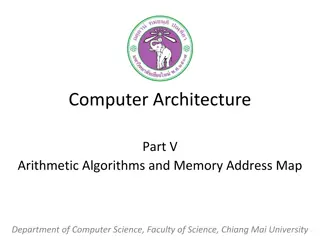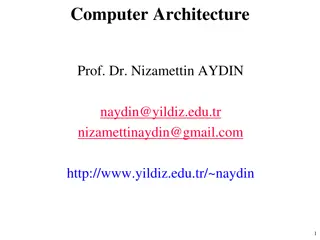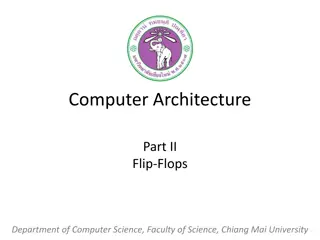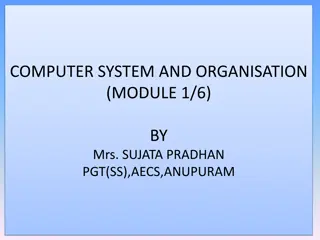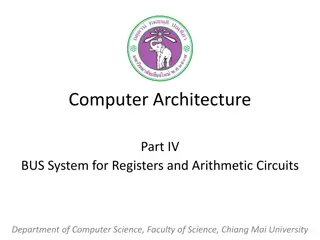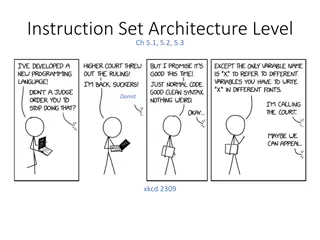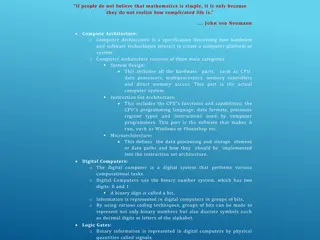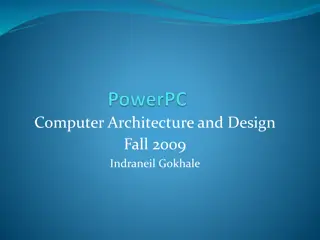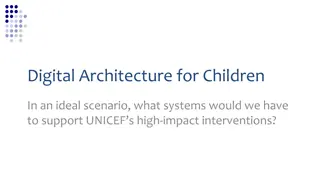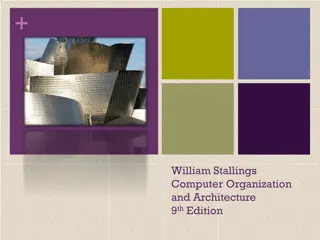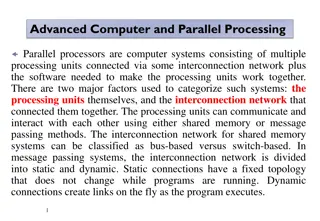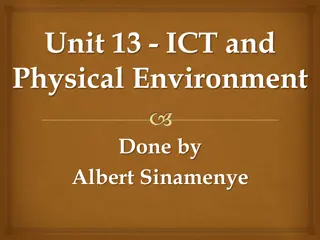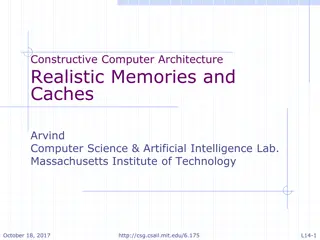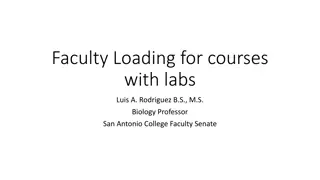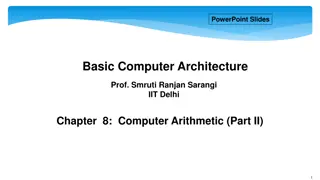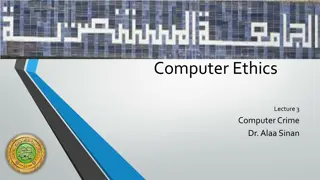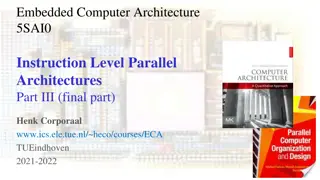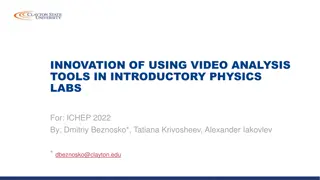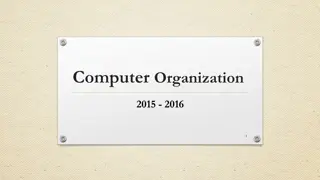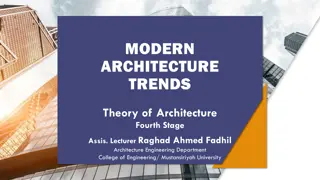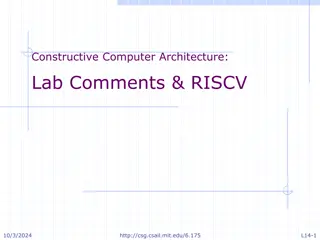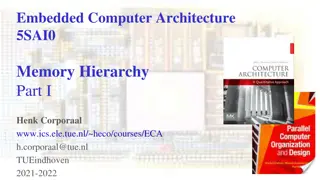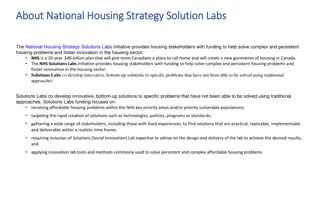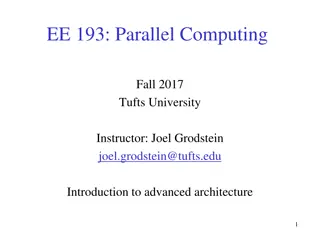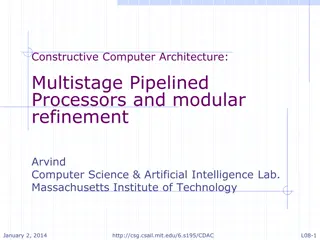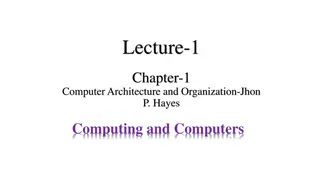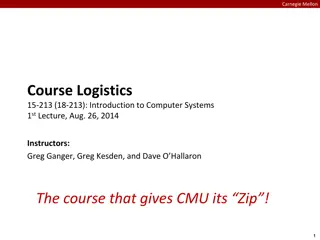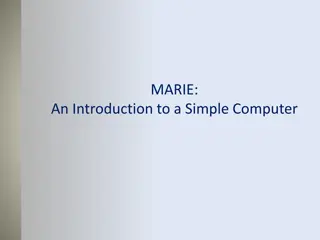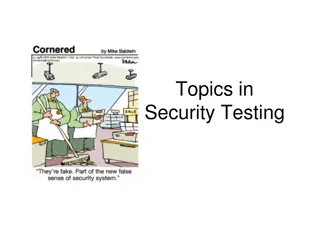❤Book⚡[PDF]✔ The Apollo Guidance Computer: Architecture and Operation (Springer
\"COPY LINK HERE ; https:\/\/getpdf.readbooks.link\/1441908765\n\nDownload Book [PDF] The Apollo Guidance Computer: Architecture and Operation (Springer Praxis Books) | The Apollo Guidance Computer: Architecture and Operation (Springer Praxis Books)\n\"\n
2 views • 6 slides
Empowering Open Source Development at Bliss Labs & OS
Bliss Labs & OS is a volunteer-based 501(c)(3) non-profit organization dedicated to nurturing and expanding open-source projects, particularly in the realm of operating systems and software. Their mission includes mentoring future open-source developers, forming alliances, and providing tools to str
0 views • 21 slides
Understanding Computer Organization and Architecture
A computer system is a programmable digital electronics device that processes data as per program instructions to provide meaningful output. It comprises hardware and software components, with hardware being the physical parts and software essential for driving the hardware. Computer organization fo
14 views • 71 slides
Decoupled SMO Architecture Overview
Develop flows showing interaction between SMO modules in the context of open-source architecture using OSC, ONAP, and other code. The objective is to align open-source work with O-RAN trends, improve synergy, reduce duplication, and provide feedback to O-RAN discussions. Related work includes Decoup
4 views • 27 slides
Virtual Labs and Cybersecurity Overview at 2021 Winter ICT Educators Conference
Welcome to the 2021 Winter ICT Educators Conference featuring sessions on virtual labs on SDN, Open Virtual Switches (OVS), cybersecurity, and more by Jorge Crichigno from the University of South Carolina. The agenda includes discussions on motivation, NETLAB environment, software-defined networking
7 views • 36 slides
Unlocking New Possibilities with Nadcab Labs Blockchain Expertise
Nadcab Labs, a leading blockchain development company, excels in creating secure and transparent blockchain solutions. From Web3 development services to custom blockchain applications, they drive innovation across finance, supply chain, healthcare, and more. Trusted globally, Nadcab Labs empowers bu
1 views • 4 slides
Evolution of IBM System/360 Architecture and Instruction Set Architectures
The IBM System/360 (S/360) mainframe computer system family, introduced in 1964, revolutionized computing by offering forward and backward compatibility, a unified instruction set architecture (ISA), and a balance between scientific and business efficiency. The critical elements of this architecture
1 views • 18 slides
Computer Architecture: Arithmetic Algorithms and Memory Address Mapping
Exploring the intricate world of computer architecture, this study delves into the realms of signed-magnitude addition and subtraction, multiplication operations, and memory address mapping for microprocessors. It uncovers the hardware components involved in these operations, such as registers, flip
1 views • 24 slides
Understanding Computer Architecture: A Comprehensive Overview by Prof. Dr. Nizamettin AYDIN
Explore the realm of computer architecture through the expertise of Prof. Dr. Nizamettin AYDIN, covering topics like RISC characteristics, major advances in computers, comparison of processors, and the driving force for CISC. Delve into the evolution of processors, register optimization, and the tra
0 views • 42 slides
Understanding Combinational Circuits in Computer Architecture
Combinational circuits in computer architecture play a crucial role in transforming binary information from input data to output data. These circuits consist of logic gates connected in a specific arrangement to process binary data efficiently. Key components such as half-adders and full-adders are
1 views • 48 slides
Understanding Computer Architecture and Organization
Computer architecture and organization are fundamental aspects of computing systems. Computer architecture focuses on the functional design and implementation of various computer parts, while computer organization deals with how operational attributes come together to realize the architectural speci
3 views • 40 slides
Understanding Computer System and Organization
Computer Organization involves the logical structure of a computer, defining the interconnections of components for optimal performance. Computers process data through an Input-Process-Output cycle, with input, processing, and output units working together. The characteristics of a computer include
1 views • 20 slides
Understanding BUS Systems in Computer Architecture
This article explores the concept of BUS systems in computer architecture, focusing on the efficient transfer of information between registers using a common bus structure. It delves into the implementation of bus systems for multiple-register configurations, such as a bus system for four registers
0 views • 24 slides
Understanding Instruction Set Architecture and Data Types in Computer Systems
In computer architecture, the Instruction Set Architecture (ISA) level is crucial in defining how a processor executes instructions. This includes the formal defining documents, memory models, registers, and various data types that can be supported. The ISA level specifies the capabilities of a proc
2 views • 13 slides
Understanding Computer Architecture and Digital Circuits
Computer architecture encompasses system design, instruction set architecture, and microarchitecture, defining how hardware and software interact to create a computer platform. Digital computers operate using the binary number system and logic gates to process information. Hardware description langu
2 views • 8 slides
PowerPC Architecture Overview and Evolution
PowerPC is a RISC instruction set architecture developed by IBM in collaboration with Apple and Motorola in the early 1990s. It is based on IBM's POWER architecture, offering both 32-bit and 64-bit processors popular in embedded systems. The architecture emphasizes a reduced set of pipelined instruc
2 views • 13 slides
Computer Science Department Information and Courses Offered
The Computer Science Department provides information on courses offered for GCSE or BTEC qualifications, specifically focusing on the AQA GCSE in Computer Science. The course equips students with valuable thinking and programming skills essential in the modern workplace, covering key concepts and pr
3 views • 7 slides
Evolution of Algorithms and Computer Science Through History
The history of algorithms and algorithmic thinking dates back to ancient times, with the development of general-purpose computational machines by Charles Babbage in the 19th century marking a significant advancement. The term "computer science" emerged in 1959, encompassing theoretical computer scie
1 views • 39 slides
Digital Architecture for Supporting UNICEF's High-Impact Interventions
In an ideal scenario, the digital architecture for children would encompass systems such as Enterprise Architecture, Functional Architecture, and Solution Architecture to support UNICEF's high-impact interventions. It would involve integrated platforms for Health Information Exchange, Supply Chain M
1 views • 19 slides
Trends in Computer Organization and Architecture
This content delves into various aspects of computer organization and architecture, covering topics such as multicore computers, alternative chip organization, Intel hardware trends, processor trends, power consumption projections, and performance effects of multiple cores. It also discusses the sca
5 views • 28 slides
Parallel Processing and SIMD Architecture Overview
Parallel processors in advanced computer systems utilize multiple processing units connected through an interconnection network. This enables communication via shared memory or message passing methods. Multiprocessors offer increased speed and cost-effectiveness compared to single-processor systems
3 views • 24 slides
Exploring ICT and Physical Environment in a School Computer Lab
A detailed look at the role of computer labs in providing services to the community, specifically focusing on the computer labs at E.S Rukomo SOPEM school with 100 laptops connected to the internet. The content also discusses rules, regulations, advantages, and disadvantages of using cell phones in
0 views • 6 slides
Constructive Computer Architecture Realistic Memories and Caches
Explore the realm of constructive computer architecture, realistic memories, and cache systems as presented by the Computer Science & Artificial Intelligence Lab at Massachusetts Institute of Technology. Delve into topics like 2-stage pipeline, magic memory models, and memory system views to gain in
0 views • 20 slides
Understanding Branching and Condition Codes in Computer Architecture
Explore the intricacies of branching statements, if-else statements, condition codes, explicit compare and branch, implicit condition codes, and the use of condition registers in computer architecture. Delve into MIPS architecture's utilization of both implicit and condition registers for efficient
0 views • 16 slides
Understanding Faculty Loading for Courses with Labs
This content provides valuable insights into the faculty loading criteria for courses with labs at San Antonio College, covering definitions of open and instructional laboratory courses, Alamo Colleges District policies, examples of lab loading, and discussions on pay inequity related to workload un
0 views • 8 slides
Computer Arithmetic in Basic Computer Architecture
This presentation delves into the realm of computer arithmetic in basic computer architecture, covering essential topics such as addition, multiplication, division, and floating-point operations. The slides illustrate techniques for integer division and the reduction of division problems, along with
0 views • 58 slides
Understanding Computer Crimes and Prevention Strategies
Computer crimes involve illegal acts utilizing computer systems, leading to various consequences. This lecture covers the types of computer system attacks, motives behind computer crimes, costs, prevention strategies, and reflection on the discussed topics. It emphasizes the increasing scope of comp
1 views • 20 slides
Embedded Computer Architecture - Instruction Level Parallel Architectures Overview
This material provides an in-depth look into Instruction Level Parallel (ILP) architectures, covering topics such as hazards, out-of-order execution, branch prediction, and multiple issue architectures. It compares Single-Issue RISC with Superscalar and VLIW architectures, discussing their differenc
0 views • 49 slides
Enhancing Introductory Physics Labs with Video Analysis Tools
Explore the innovation of incorporating video analysis tools in introductory physics labs to enhance students' learning experiences, support hybrid learning formats, and develop new skills in data analysis and experimentation. Leveraging tools like Tracker software, labs can now be conducted remotel
0 views • 8 slides
Understanding Computer Organization: Instruction Set Architecture and Interrupts
Explore the critical concepts of Computer Organization focusing on Instruction Set Architecture (ISA) and Interrupts. ISA serves as the interface between hardware and software, enabling programmers to write machine language programs effectively. Learn about Application Binary Interface (ABI), interr
0 views • 26 slides
Exploring Modern Architecture Trends: Expressionism and Bauhaus Movement
Delve into the world of modern architecture trends, focusing on Expressionist architecture in Europe during the early 20th century and the influential Bauhaus movement in Germany. Expressionist architecture emphasized emotional effects through distorted forms inspired by nature, while the Bauhaus sc
0 views • 10 slides
Understanding Conflict-Free FIFO in Computer Architecture Labs
Exploring the concept of Conflict-Free FIFO in computer architecture labs, this content delves into the grading of FIFO designs and the challenges faced in creating conflict-free implementations. It discusses the typical use of FIFOs for enqueuing, dequeuing, and clearing operations, emphasizing the
0 views • 28 slides
Understanding Memory Hierarchy and Different Computer Architecture Styles
Delve into the concepts of memory hierarchy, cache optimizations, RISC architecture, and other architecture styles in embedded computer architecture. Learn about Accumulator and Stack architectures, their characteristics, advantages, and example code implementations. Explore the differences between
0 views • 52 slides
National Housing Strategy Solution Labs Overview
The National Housing Strategy Solutions Labs initiative aims to address complex housing issues by providing funding to stakeholders for innovative solutions. With a focus on affordability and vulnerable populations, the Labs bring together diverse stakeholders to co-develop practical and replicable
0 views • 7 slides
Understanding Advanced Computer Architecture in Parallel Computing
Covering topics like Instruction-Set Architecture (ISA), 5-stage pipeline, and Pipelined instructions, this course delves into the intricacies of advanced computer architecture, with a focus on achieving high performance by optimizing data flow to execution units. The course provides insights into t
0 views • 12 slides
Constructive Computer Architecture: Multistage Pipelined Processors
Explore the concepts of multistage pipelined processors and modular refinement in computer architecture as discussed by Arvind and his team at the Computer Science & Artificial Intelligence Lab, Massachusetts Institute of Technology. The content delves into the design and implementation of a 3-stage
0 views • 28 slides
Understanding Computer Architecture and Computing History
Delve into the realms of computer architecture, organization, and computing history through discussions on the attributes visible to programmers, implementation features, and the evolution from manual calculation tools like the abacus and slide rule to modern computing devices. Explore the elements
0 views • 10 slides
Carnegie Mellon Course Logistics: Introduction to Computer Systems
Carnegie Mellon University offers the course 15-213: Introduction to Computer Systems, taught by instructors Greg Ganger, Greg Kesden, and Dave O. Hallaron. The course covers essential topics in computer systems and programming, emphasizing practical skills through lectures, labs, and exams. Recomme
0 views • 23 slides
Understanding MARIE: A Simple Computer Architecture
Explore the MARIE architecture through components like registers and buses, learning about binary representation, instruction set, and data movement. Understand how MARIE simplifies the understanding of computer functions, following Leonardo Da Vinci's advice to keep it intuitive and easy. Discover
0 views • 30 slides
Understanding Security Testing and Architecture
Explore the fundamentals of security testing, computer security goals, software security approach, and security architecture. Learn about securing computer assets, verifying trustworthiness of security mechanisms, and validating security architecture through threat modeling. Enhance your knowledge o
0 views • 57 slides
![❤Book⚡[PDF]✔ The Apollo Guidance Computer: Architecture and Operation (Springer](/thumb/21611/book-pdf-the-apollo-guidance-computer-architecture-and-operation-springer.jpg)




